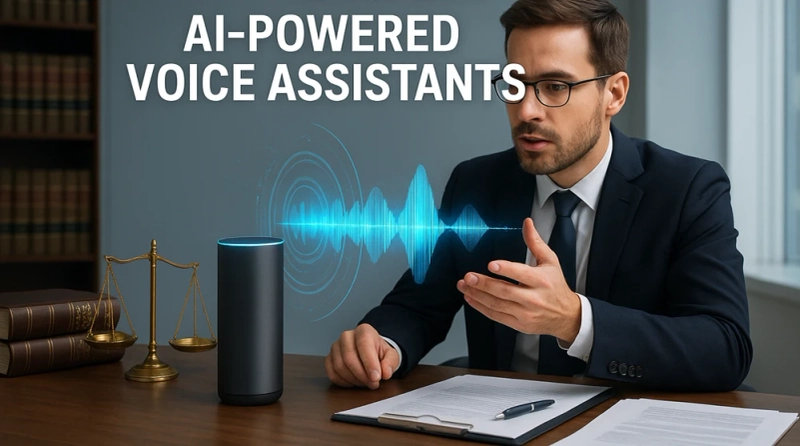For law firms and legal departments, time is the most expensive resource. Attorneys often juggle case preparation, client meetings, and endless documentation while still being expected to respond promptly to inquiries. This is where Voice Assistants for Legal operations are starting to play a transformative role. By automating routine tasks, voice-driven technology allows lawyers and staff to focus on higher-value activities.
In recent years, a Voice AI assistant has shifted from being a futuristic concept to a practical tool adopted by forward-looking firms. From scheduling client calls to documenting case notes, these systems are steadily changing the way legal teams operate.
Why the Legal Industry Needs Voice Technology
Legal work is complex, but much of a lawyer’s daily routine is filled with administrative tasks. According to a 2023 American Bar Association report, lawyers spend nearly 40% of their time on non-billable activities, including client intake, data entry, and routine communication.
This is not just lost time—it directly impacts revenue and productivity. By implementing Voice Assistants for Legal, firms can reduce time spent on repetitive processes, ensuring lawyers focus on legal strategy instead of paperwork.
Practical Applications of Voice Assistants in Law Firms
Voice assistants are not limited to setting reminders. Their role in the legal sector is far more strategic. Here are some key areas where they add value:
- Client Intake & Screening
A voice AI receptionist can greet potential clients, answer preliminary questions, and record essential details before passing them to attorneys.
- Scheduling & Calendar Management
Voice assistants streamline appointment booking by checking availability, reducing scheduling conflicts, and even sending automated reminders.
- Document Drafting & Review
Lawyers can dictate memos or briefs, and the assistant transcribes them instantly, saving hours of typing and editing.
- Case Research Support
With integrations, voice systems can retrieve relevant case laws or precedents quickly when prompted.
- Billing & Time Tracking
Instead of manual entries, voice assistants can log billable hours in real time during calls or meetings.
Benefits of Using Voice Assistants for Legal Workflows
The adoption of Voice Assistants for Legal doesn’t just save time—it improves firm-wide efficiency. Some measurable benefits include:
- Increased Productivity
Lawyers reclaim billable hours that were previously lost to admin work.
- Cost Savings
Firms spend less on routine staff tasks while improving overall output.
- Improved Client Satisfaction
Faster response times and smoother communication lead to stronger client relationships.
- Data Accuracy
Automated transcription and entry reduce human errors.
- Scalability
As caseloads grow, voice assistants can handle more queries without needing proportional staffing increases.
Challenges and Considerations
Of course, adoption isn’t without hurdles. Law firms must consider:
- Data Security: Client confidentiality is paramount, and any voice tool must meet strict compliance standards.
- Integration with Existing Systems: Voice assistants work best when integrated with practice management or CRM software.
- User Training: Teams must adapt to using the new system efficiently.
However, these challenges are not insurmountable. Vendors offering Voice Assistants for Legal now provide encrypted solutions with seamless integrations for widely used tools like Clio or PracticePanther.
Industry Adoption Trends
According to a Legal Technology Survey Report (2024), 31% of mid-sized law firms have already started using some form of voice-enabled technology. Larger firms are showing even faster adoption, especially in areas like dictation and automated scheduling.
Notably, clients are increasingly open to interacting with AI-powered systems for initial inquiries, as long as the communication is seamless and professional. This is why the voice AI receptionist is becoming a common first point of contact in modern law offices.
Future of Voice in the Legal Sector
The road ahead suggests that Voice Assistants for Legal will move beyond task automation to becoming strategic partners. For instance:
- Predictive Scheduling: Systems that recommend the best times for client calls based on historical patterns.
- Legal Research Summarization: Voice assistants summarizing lengthy case laws into short, digestible audio briefs.
- Personalized Client Follow-Ups: Automated voice-driven check-ins for case updates, ensuring clients never feel neglected.
The role of Voice AI assistant technology will only expand as natural language processing becomes more advanced.
Final Thoughts
Legal practice has always been about precision, time management, and client trust. By adopting Voice Assistants for Legal, firms can align with modern expectations while staying competitive. Whether through a voice AI receptionist handling intake or automated transcription tools cutting down drafting time, these assistants are quickly proving indispensable.
The firms that adopt voice technology today are positioning themselves not just for efficiency, but for growth in an industry that increasingly values responsiveness and client-first communication.
“Lawyers who embrace AI-driven voice tools are not replacing human expertise—they’re multiplying their capacity to serve clients better.”
For business leaders in the legal space, the message is clear: voice technology isn’t the future, it’s the present. And the sooner firms adapt, the sooner they reap the productivity gains.


